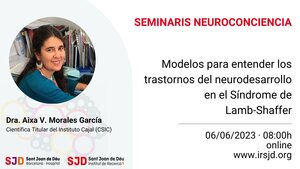#NeuroConCiencia|Models to understand neurodevelopmental disorders in Lamb-Shaffer Syndrome
- Speakers: Dra. Aixa V. Morales García, Científica Titular del Instituto Cajal (CSIC)
Abstract
Lamb-Shaffer Syndrome (LSS) is a rare genetic developmental disorder caused by point mutations and deletions in the SOX5 gene. Many of the alterations in LSS patients have a neurological basis, including intellectual disability, memory loss, learning difficulties, and social behavioral abnormalities within the autism spectrum disorder. SOX5 encodes a transcription factor with important functions in the vertebrate nervous system (Martínez-Morales et al., 2010; Quiroga et al., 2015). In a recent study, we have demonstrated that Sox5 promotes adult neurogenesis in the dentate gyrus (DG) of the mouse hippocampus (Li et al., 2022). This region of the hippocampus is crucial in memory and learning processes. Using conditional and inducible mouse models for Sox5, we are analyzing the role of Sox5 in the development of the CA2 region of the hippocampus (involved in social memory) and the DG (spatial memory). These approaches in transgenic mice will allow us to understand the neuropathological basis of LSS and use these models to test potential pharmacological strategies to correct or mitigate the neurodevelopmental alterations in LSS.
Language: spanish
Registration

